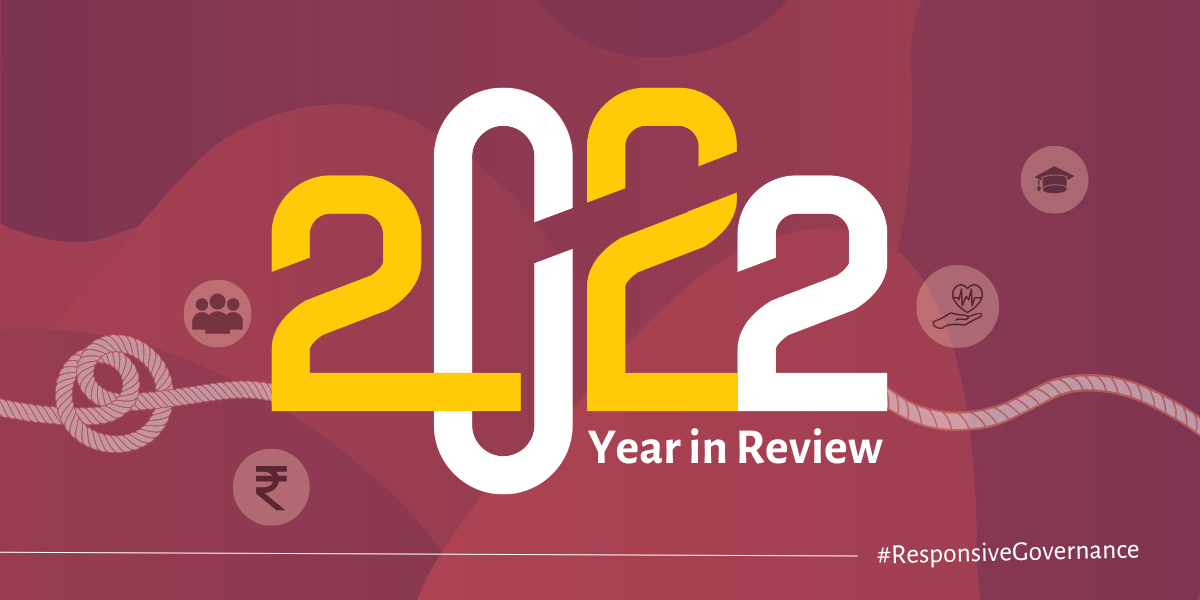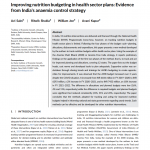
2022 in Review: Untying the Knots
24 December 2022
As India emerged from the long shadow cast by the pandemic, one thing was reconfirmed for us — knowledge and accurate information are key to finding solutions to the country’s persistent development challenges. In the year 2022, we chose to unknot some tough policy questions and cross-pollinate knowledge about them to catalyse Responsive Governance or a public system that is responsive to citizen needs. Below is a sample of our efforts.
How is India’s welfare system faring given current fund flows?
‣ Crores of rupees are being allocated to welfare programmes. Like every year since 2008, we published our flagship Budget Briefs series to unpack this. The 14th volume contained the trends in allocations, release, expenditure and implementation for 9 major Centrally Sponsored Schemes (CSSs). They spanned health, nutrition, education, rural livelihoods, housing, the availability of water, and food security. The volume is available here.
‣ Sharad Pandey, Avani Kapur, and Tanya Rana wrote a Working Paper on State Finances in FY 2022-23. This paper attempted to break down the dynamics between the Union and state governments, and focused on Grants-in-Aid from the Union government. By looking at state budgets over a period of five years from FY 2017-18 to FY 2022-23, the soon-to-be published paper looks at the trends in dependence of states on Union transfers, with a focus on CSSs.
‣ Government’s ability to raise, allocate, and use public funds effectively forms the cornerstone of its ability to provide public goods and undertake service delivery. Encouraging conversation on public finance management has been our longstanding focus. As part of this year’s CPR Dialogues, we hosted a panel featuring leaders in the public finance management space on The Welfare State in the Digital Age: Planning for Stronger Public Fund Flows. We hosted another panel discussion on what can constitute an agile Public Finance Management System (PFMS) and evidence-based next steps with MSC (MicroSave Consulting) earlier this year. Key takeaways can be found here.
What are the emerging priorities in health?
‣ For over 14 years, the Accountability Initiative has developed a deep understanding of health budgets, which we have regularly shared with the public. Taking another step in this direction, we collaborated with the World Bank to produce a primer entitled ‘Understanding India’s Health Budgets’. The primer’s main objective is to offer the reader a way to simply understand and accurately interpret India’s Union and state health budgets. It includes guidance on existing processes, involved actors, types of budget documents, and terminologies to keep in mind. The primer will be available in the public domain in early 2023.
‣ Ritwik Shukla and Avani Kapur co-authored a paper on ‘Methods and Lessons from Costing a Large mHealth Intervention at Scale in India’. Among its objectives was to present a detailed protocol for determining the costs of a large national mHealth job aid and behaviour change communication tool known as the Integrated Child Development Services – Common Application Software (ICDS-CAS). The paper presents lessons for policymakers on how to ensure financial planning for scaling mHealth interventions. The study uses the Activity Based Costing—Ingredients (ABC-I) method, which brings clarity to costs for each input and activity, across levels and geographies.
What are the learnings on government nutrition interventions?
‣ Researchers at the Accountability Initiative collaborated with researchers at the International Food Policy Research Institute to write a policy note on Financing for Nutrition in India. This note examined costs to fully finance a set of core Direct Nutrition Interventions (DNIs) at scale in FY 2022-23. This exercise is crucial to enable better planning, budgeting, and decision-making to ensure maximum possible coverage of nutrition for children, pregnant and lactating women, and adolescent girls in India.
‣ Avani Kapur and Ritwik Shukla co-authored a paper with researchers from the Institute of Economic Growth entitled ‘Improving nutrition budgeting in health sector plans: Evidence from India’s anaemia control strategy’. Following the four phases of the budget cycle — planning, allocations, disbursements and expenditure — this paper presented a new method to track nutrition budgets within health sector plans. Using the example of the Anemia Mukt Bharat (AMB), it reported preliminary findings on the application of the first two phases of the method, that is, to track and act for improved planning and allocations, for 12 states.
‣ A new interactive learning tool called Mapping Governance was launched to provide practitioners with a comprehensive, macro-level understanding of government structures responsible for delivering nutrition related public services in Bihar, Madhya Pradesh, and Rajasthan. Similarly, maps linked to education were also created. Both thematic streams are available here.
How is India’s welfare architecture operating post-pandemic?
‣ In September 2022, a new Memorandum of Understanding (MoU) was signed between the Accountability Initiative and the Government of Meghalaya to understand the on-ground status of the Sustainable Development Goals (SDGs) in the state. The project involves interviews with key stakeholders across various indicators, discussions with government departments, and household-level field surveys across the 11 districts of Meghalaya. In addition, we assisted the departments of Finance and Planning in developing Meghalaya’s first Gender and Youth Budgets as part of a previous MoU.
‣ We are also supporting the Government of Andhra Pradesh to undertake an evaluation of some of its welfare programmes.
‣ We partnered with the Chief Minister of Rajasthan’s Economic Transformation Advisory Council (CMRETAC) to understand data use for better policy formulation. This project includes mapping data generation, use, and processes across education, health and family welfare, and rural development departments. The study will focus on identifying limitations, duplication, and redundancies. It will recommend methods to manage data flows and use it for effective decision-making, while considering global and domestic best practices.
‣ Tribal Sub Plan (TSP) funds are difficult to track once they leave the Government of India’s coffers. Researchers at the Accountability Initiative are tracking overall spending of the TSP component and attempting to estimate tribal health spending across five districts spanning three states in order to understand the emerging patterns in health financing in tribal areas. The analysis will be informed through qualitative interviews with key stakeholders both within and outside government. This study has received the support of Piramal Swasthya.
‣ Sidharth Santhosh, Ritwik Shukla, and Avani Kapur prepared an issue brief detailing how convergence is understood by the Mahatma Gandhi National Rural Employment Guarantee Scheme (MGNREGS). The study looks at various government documents, including guidelines, letters, and circulars.
‣ Kiran Bhatty, Mridusmita Bordoloi, Avani Kapur, Mohammad Hamza and Anupriya Singh wrote a background paper entitled the ‘Regulation of Non-State Actors in School Education in India’. Commissioned by the UNESCO Global Education Monitoring (GEM) Report, the paper serves as background research for the development of the GEM 2022 Regional Report on non-state actors in education in South Asia.
‣ The PULSE (Platform to Understand, Learn, Share and Exchange) for Development was launched in 2020, immediately after the COVID-19 pandemic began in India, in order to bring together development practitioners who were working to mitigate the pandemic’s adverse impacts. In 2022, a conscious decision was made to connect practitioners also on longstanding development challenges confronted by India and the attainment of the SDGs. The revamped community of practice that reflects this change will come into action from the first month of 2023.
‣ To mark the 75th year of India’s independence, an exclusive interview series called State Speak was launched. The interviews have captured the experience of IAS officers posted in India’s districts and other public officials who have a vantage point on how the country is being governed, related challenges, and best practices. The collection of interviews is available here, and provide valuable insights into decision-making associated with local communities.
‣ We have been supporting the Ministry of Rural Development on two national-level surveys (Ease of Living and Mission Antodaya) through data checks, validation, and analysis of previously completed surveys. Furthermore, suggestions were provided for improving the surveys and data quality.
What are the lived experiences of frontline officials, and citizens?
‣ Launched in 2020, almost-immediately after the onset of the COVID-19 pandemic in India, Inside Districts has been our flagship interview series that documents the experiences of frontline workers, government officials, and eligible citizens of government schemes. Over 150 interviews from Bihar, Himachal Pradesh, Madhya Pradesh, Maharashtra, and Rajasthan have been published in the past two years. In 2022, the focus of the series was expanded to cover longer term development challenges of the country, with rich information emerging on labour rights and the migration of informal workers for livelihoods, among other aspects. Know about their perspectives, in their own voice at this link.
‣ Avani Kapur and Sidharth Santhosh co-authored a paper that characterises the challenges that street-level bureaucrats are facing in five Indian states amidst digital transitions in the provisioning of social welfare schemes. The authors presented their initial findings at the Indian Institute of Management Ahmedabad’s IPPN Annual Conference in December 2022. The paper is due to be published.
‣ Tanya Rana and Ritwik Shukla conducted a Needs Analysis for Women’s Safety Schemes, which examined the costs and needs for providing key women’s safety schemes – One Stop Centre (OSC) and Shakti Sadan (SS) – of the Ministry of Women and Child Development (MWCD). The findings suggest that there are significant gaps in the number of victims of Violence Against Women (VAW) receiving assistance to those who may need it. This, correspondingly, leads to under-estimating the number of shelter facilities to VAW victims in India in FY 2021-22. The brief will be available in the public domain in early 2023.
How can citizen participation in governance be augmented?
‣ For close to half a decade, our flagship learning programme – ‘Hum Aur Humaari Sarkaar’ – has sparked deliberation on the government system among grassroots development leaders. Two offline courses were conducted in Madhya Pradesh and Bihar, training 70 grassroot development professionals. In addition, keeping with demand, two additional modules on Social Protection and E-governance were added to the course. Also, course alumni and practitioners at-large continued to access the Hum Aur Humaari Sarkaar website. The website’s three most popular sections are – ‘Prashasan ke sitaare‘ (Star performers from the public administration), ‘Seekhne ke saadhan’ (Learning resources), and ‘Saathiyon ke vichaar’ (Alumni speak).
‣ Sidharth Santhosh, Rajika Seth, Avani Kapur and Neeha Susan Jacob conducted a study that unpacks how social accountability mechanisms are institutionalised. The study proposes a novel framework to understand the process of institutionalisation by looking at dimensions such as incentives and institutional design. The team members studied the design and implementation of the Meghalaya Community Participation and Public Services Social Audit Act of 2017 to test the framework. A research paper and a policy note will be released in early 2023.
‣ Project ‘Samanvay’, in collaboration with Piramal Foundation, is aimed at the capacity building of Panchayati Raj Institution members from the tribal district of Barwani (Pati Block), Madhya Pradesh. Among the objectives is to enable them to learn and reflect on the complexities of the administrative and financial structures that they operate within, as well as engineer solutions at their level.
‣ In-person sessions of another flagship learning programme – ‘Understanding State Capabilities’ – was conducted for students from the FLAME University and the Indian School of Development Management. A workshop was also conducted with staff of Mantra4Change on ‘Understanding the Bureaucracy’.





